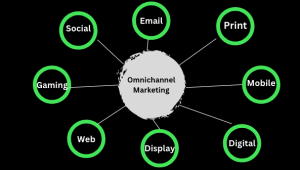Omnichannel Marketing
Definition
Omnichannel marketing is a marketing strategy that creates a seamless and integrated customer experience across all channels and touchpoints, both online and offline.
Description
It helps by providing a seamless and consistent customer experience across all touchpoints, which enhances customer satisfaction, loyalty, and engagement.

In addition, by creating a unified brand experience, it can increase customer lifetime value, drive sales, and improve brand reputation. It involves delivering consistent and personalised messaging and offers to customers through multiple channels, such as social media, email, SMS, mobile apps, in-store, and online, to provide a cohesive and convenient customer experience, regardless of how they engage with the brand.
It aims to enhance the customer experience, build customer loyalty, and drive sales.
Importance of Omnichannel Marketing
Omnichannel marketing is a marketing strategy that provides customers with a seamless and integrated experience across multiple channels, including online, mobile, social media, email, and in-store. Here are some reasons why it is important:
- Increased Customer Engagement: It helps businesses engage with customers more effectively by providing them with a consistent message and experience across multiple channels. This can lead to increased customer engagement, loyalty, and, ultimately, sales.
- Improved Customer Experience: With omnichannel marketing, customers can choose the channel that suits their preferences and needs best, and businesses can deliver a personalised experience. This can result in an improved customer experience, which can lead to customer satisfaction and retention.
- Increased Sales: It allows businesses to reach customers through multiple channels, which can lead to increased sales. By providing customers with a seamless experience across all channels, businesses can encourage customers to make purchases.
- Better Data Collection: It allows businesses to collect more data about their customers across multiple channels. This data can be used to better understand customer behaviour and preferences, which can inform future marketing efforts.
- Competitive Advantage: With this marketing, businesses can differentiate themselves from their competitors by providing a better customer experience. This can increase brand loyalty and a competitive advantage in the marketplace.
How to create an omnichannel marketing strategy?
Omnichannel marketing is a marketing strategy that provides customers with a seamless and integrated experience across multiple channels, including online, mobile, social media, email, and in-store. Here are some reasons why it is essential:
- Increased Customer Engagement: It helps businesses engage with customers more effectively by providing them with a consistent message and experience across multiple channels. This can lead to increased customer engagement, loyalty, and sales.
- Improved Customer Experience: With omnichannel marketing, customers can choose the channel that suits their preferences and needs best, and businesses can deliver a personalised experience. This can improve customer experience, leading to customer satisfaction and retention.
- Increased Sales: It allows businesses to reach customers through multiple channels, which can lead to increased sales. By providing customers with a seamless experience across all channels, businesses can encourage customers to make purchases.
- Better Data Collection: It allows businesses to collect more data about their customers across multiple channels. This data can be used to better understand customer behaviour and preferences, which can inform future marketing efforts.
- Competitive Advantage: With this, businesses can differentiate themselves from their competitors by providing a better customer experience. This can increase brand loyalty and a competitive advantage in the marketplace.
Future of Omnichannel Marketing?
The future of omnichannel marketing constantly evolves as new technologies emerge and customer behaviour changes. Here are some potential trends and developments that may shape the future:
- Mobile-first Approach: As mobile devices become increasingly ubiquitous, businesses must adopt a mobile-first approach to omnichannel marketing. This means ensuring all channels, including websites and social media, are optimised for mobile devices.
- Voice-Activated Assistants: With the rise of voice-activated assistants such as Amazon Alexa and Google Home, businesses must consider integrating these devices into their marketing strategies. This may include developing voice-activated apps or integrating with existing platforms.
- Hyper-Personalization: As customer data becomes more readily available, businesses can provide hyper-personalised experiences across all channels. This may include using AI and machine learning algorithms to analyse customer behaviour and preferences and tailoring marketing messages and offers accordingly.
- Augmented Reality: Augmented reality (AR) is expected to play an increasingly important role in this, allowing businesses to create immersive customer experiences. For example, customers can virtually try on clothes or view products in 3D before purchasing.
- Social Commerce: Social media platforms are already an important channel for businesses to reach customers; this trend is expected to continue. In the future, we may see even more integration between social media and e-commerce, allowing customers to purchase directly from social media platforms.
Benefits of Omnichannel Marketing
Omnichannel marketing offers a range of benefits to businesses that can help improve customer experience and drive growth. Here are some of the critical benefits:
- Improved Customer Experience: Omnichannel marketing provides a seamless and consistent experience for customers across all channels, allowing them to engage with the brand in the way that suits them best. This improves customer satisfaction and loyalty.
- Increased Sales: Businesses can improve sales and revenue by providing a more personalised experience for customers. Omnichannel customers have been shown to have a higher lifetime value than single-channel customers.
- Better Data and Insights: It allows businesses to collect and analyse data from multiple channels, providing a more complete view of customer behaviour and preferences. This can help businesses make more informed decisions and improve their marketing strategies.
- Increased Efficiency: By streamlining marketing efforts across all channels, businesses can improve efficiency and reduce costs. This can help improve profitability and free up resources for other business areas.
- profitability and free up resources for other business areas.
Competitive Advantage: Businesses adopting this approach can gain a competitive advantage over those not. By providing a superior customer experience, businesses can differentiate themselves from their competitors and attract new customers.
Example

Myntra is one of India’s most significant online fashion and lifestyle retailers that has successfully implemented an omnichannel marketing strategy to provide a seamless and consistent customer experience across all channels. Here’s how Myntra’s marketing works:
- Online Shopping: Myntra’s e-commerce platform allows customers to browse and purchase products online. The platform is optimised for mobile devices, making it easy for customers to shop on the go. Customers can choose from various products, including clothing, footwear, accessories, and more.
- In-Store Pick-Up: Myntra lets customers pick up online orders from physical stores. This allows customers to avoid shipping costs and receive their orders faster. Myntra also uses these physical stores as fulfilment centres, which allows the company to reduce delivery times and improve customer satisfaction.
- Mobile App: Myntra has a mobile app that allows customers to browse products, make purchases, and track their orders. The app also features personalised recommendations based on a customer’s browsing and purchase history. Customers can also use the app to scan barcodes in-store and view product information and reviews.
- Social Media: Myntra uses social media channels like Facebook, Instagram, and Twitter to engage customers and provide personalised recommendations. The company uses social media to showcase its products, share fashion tips, and offer exclusive discounts and promotions.





We would love to have your opinion.